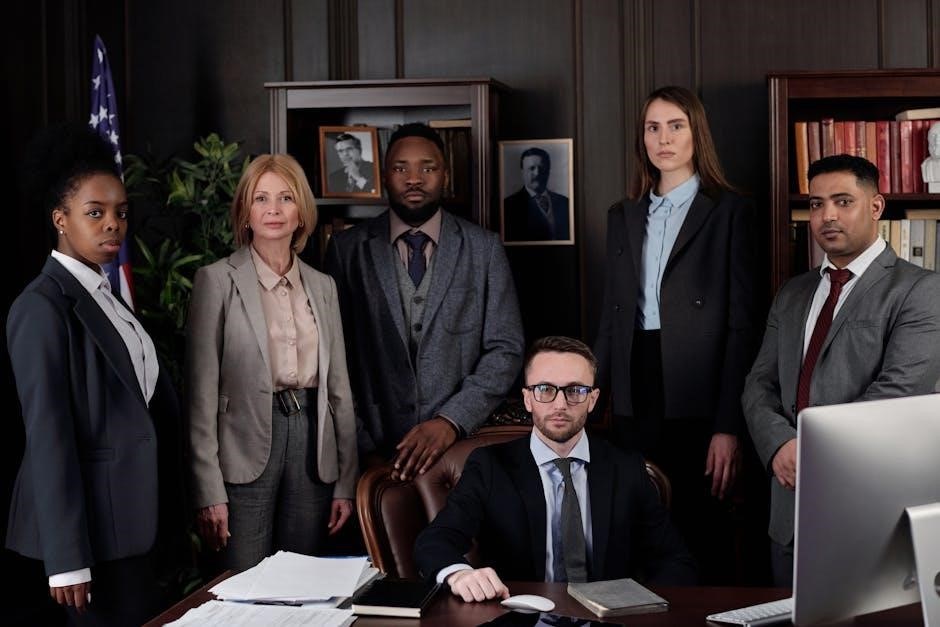The Massachusetts Open Meeting Law ensures transparency and public access to government deliberations‚ promoting accountability. It is codified in M.G.L. Chapters 39 and 43A‚ with recent updates extending provisions to June 30‚ 2027.
1.1 Overview of the Law and Its Importance
The Massachusetts Open Meeting Law mandates that public bodies conduct meetings in an open and transparent manner. It ensures citizens can access and participate in decision-making processes‚ fostering trust and accountability. Compliance is crucial to maintain public confidence and uphold democratic principles.
1.2 Historical Context and Recent Updates
Enacted in 1975‚ the Massachusetts Open Meeting Law was designed to ensure transparency in government. Recent updates‚ including the extension of temporary provisions to June 30‚ 2027‚ reflect evolving needs. The COVID-19 pandemic also prompted changes‚ allowing virtual meetings and remote participation‚ ensuring continued public access and compliance with modern governance requirements.

Key Definitions and Terminology
This section clarifies key terms under the Massachusetts Open Meeting Law‚ including definitions of a public body‚ meeting‚ deliberation‚ and decision-making‚ ensuring compliance and transparency.
2.1 What Constitutes a “Public Body”
A public body under the Massachusetts Open Meeting Law includes any board‚ commission‚ or committee appointed by a governmental entity. This applies to state and local levels‚ encompassing entities performing public functions. Private entities are included only if they carry out public duties. The definition ensures broad applicability‚ promoting transparency in governmental decision-making processes.
2.2 Understanding “Meetings” Under the Law
A meeting under the Massachusetts Open Meeting Law is any gathering of a quorum of a public body‚ whether in-person‚ virtual‚ or remote‚ to discuss public business. It includes deliberations leading to decisions‚ ensuring transparency. Meetings require advance notice and public access‚ with minutes kept for accountability. This broad definition ensures all relevant discussions are open to the public.
2.3 Definitions of “Deliberation” and “Decision-Making”
Deliberation refers to discussions among public body members aimed at formulating decisions‚ requiring transparency. Decision-Making involves official actions like voting. Both must comply with the Open Meeting Law‚ ensuring public access and accountability. These definitions ensure all discussions and actions are conducted openly‚ maintaining trust and fostering accountability in governance.

Purpose and Scope of the Open Meeting Law
The Massachusetts Open Meeting Law ensures transparency and accountability in government by requiring public access to meetings and decision-making processes‚ fostering public trust and participation.
3.1 Ensuring Government Transparency
The Massachusetts Open Meeting Law mandates that public bodies conduct meetings openly‚ providing citizens with clear access to discussions and decisions. This fosters trust by ensuring all actions are visible and accountable‚ aligning with the principle that government activities should be conducted in an open and accessible manner for public scrutiny and understanding.
3.2 Promoting Public Participation in Governance
The law empowers citizens by granting them the right to attend and speak at public meetings‚ fostering direct engagement in decision-making. This encourages active participation‚ ensuring that community voices are heard and valued. Transparent processes and accessible meeting procedures further enhance public involvement‚ creating a more inclusive and responsive governance system for all residents.

Compliance Strategies for Public Bodies
Public bodies must adhere to legal requirements‚ ensure transparency‚ maintain accurate records‚ and implement accessibility measures to comply with the Open Meeting Law effectively.
4.1 Posting Meeting Notices Properly
Meeting notices must be posted in a designated public location and‚ if applicable‚ on the body’s website‚ at least 48 hours before the meeting‚ excluding weekends and holidays. Notices should include the date‚ time‚ place‚ and agenda. Proper posting ensures compliance with transparency requirements and allows the public to stay informed and participate.
4.2 Preparing and Sharing Agendas
Agendas must be clear‚ detailed‚ and shared publicly before meetings. They should list all items for discussion or action‚ ensuring transparency. Public bodies must distribute agendas to members and make them available to the public‚ either online or in a designated location. This practice promotes informed participation and aligns with the law’s transparency goals‚ fostering accountability and public trust.
4.3 Keeping Accurate Meeting Minutes
Meeting minutes must be accurate‚ comprehensive‚ and reflect discussions‚ decisions‚ and actions taken. They should include the date‚ time‚ location‚ members present‚ and a detailed summary of topics addressed. Minutes must be approved and made available to the public‚ ensuring transparency and accountability. This practice supports the law’s goals of openness and public trust in governmental processes and decision-making activities.

Public Participation in Open Meetings
Citizens have the right to attend and speak at public meetings‚ fostering transparency and accountability. Public input is essential for informed decision-making‚ ensuring community voices are heard.
5.1 Rights of Citizens to Attend and Speak
Citizens have the right to attend public meetings and express opinions during designated times. This ensures transparency and accountability‚ fostering trust in governance. Open meetings allow residents to engage directly with officials‚ providing insights that shape decisions. Guidelines ensure fairness and equity in public participation‚ with reasonable time limits for comments to maintain order and productivity.
5.2 Best Practices for Engaging the Public
Public bodies should actively encourage participation by providing clear agendas‚ accessible materials‚ and opportunities for public comment. Using technology‚ like virtual meetings‚ ensures inclusivity. Engaging the public through surveys or forums fosters trust and accountability. Transparent communication and timely responses to inquiries further enhance public engagement‚ ensuring that all voices are heard and valued in the decision-making process.

Electronic Meetings and Remote Participation
Electronic meetings allow public bodies to conduct sessions remotely‚ ensuring inclusivity and accessibility. The law now permits virtual meetings‚ with provisions extended to June 30‚ 2027.
6.1 Rules for Conducting Virtual Meetings
Virtual meetings must comply with specific rules‚ including proper public notice‚ ensuring two-way communication for public participation‚ and maintaining a quorum. All members must be audible‚ and meetings must be recorded. The law requires accessibility measures to ensure all participants can engage fully‚ fostering transparency and compliance with the Open Meeting Law standards.
6.2 Ensuring Accessibility in Remote Meetings
Remote meetings must provide accommodations for participants with disabilities‚ including closed captions‚ sign language interpreters‚ and accessible documents. Platforms used for virtual meetings must comply with accessibility standards‚ ensuring all participants can fully engage. Public bodies must ensure that all technological tools used are compatible with assistive technologies‚ fostering inclusivity and equal participation in accordance with the Open Meeting Law requirements.
Enforcement and Penalties for Non-Compliance
Violations of the Open Meeting Law are enforced by the Massachusetts Attorney General‚ with penalties for non-compliance‚ ensuring accountability and fostering public trust in governance.
7.1 Filing Complaints Under the Law
Citizens can file complaints alleging Open Meeting Law violations with the Massachusetts Attorney General. The complaint must be submitted in writing‚ detailing the alleged violation‚ including dates and specifics. The Attorney General’s office reviews complaints to determine potential violations‚ ensuring accountability and transparency in governmental processes. This step is crucial for upholding the law’s intent and public trust.
7.2 Consequences of Violating the Open Meeting Law
Violations of the Open Meeting Law can result in fines and legal action. Public bodies may face penalties for non-compliance‚ and decisions made in violation may be invalidated. Additionally‚ officials may be required to undergo training to ensure future adherence to the law‚ emphasizing accountability and the importance of transparency in governmental proceedings.
Training and Resources for Compliance
Public officials must complete mandatory training to understand the Open Meeting Law. State agencies provide guidance and resources to ensure compliance and promote transparency in governance.
8.1 Mandatory Training for Public Officials
Public officials in Massachusetts are required to complete mandatory training on the Open Meeting Law. This training‚ often conducted by the Attorney General’s office‚ covers legal requirements‚ meeting notices‚ agendas‚ minutes‚ and deliberation rules. It ensures officials understand their responsibilities to maintain transparency and compliance. Training materials are accessible online‚ and completion is essential to avoid penalties for non-compliance.
8.2 Accessing Guidance from State Agencies
Public officials can access guidance from state agencies‚ such as the Massachusetts Attorney General’s Office‚ which provides detailed resources on compliance. These include toolkits‚ FAQs‚ and training materials to clarify legal requirements. Local governments and state bodies also offer support to ensure transparency and compliance‚ helping officials navigate complex regulations effectively while maintaining public trust.

Recent Updates and Changes to the Law
The Massachusetts Open Meeting Law has been updated‚ with temporary provisions extended to June 30‚ 2027. These changes reflect evolving meeting practices‚ particularly post-COVID-19‚ ensuring continued transparency.
9.1 Temporary Provisions Extended to June 30‚ 2027
The Massachusetts Legislature extended temporary provisions under the Open Meeting Law until June 30‚ 2027. These provisions allow public bodies to continue conducting certain meetings remotely and posting materials electronically‚ ensuring flexibility while maintaining transparency and public access to governmental decision-making processes.
9.2 Impact of COVID-19 on Meeting Practices
COVID-19 significantly influenced meeting practices under the Open Meeting Law‚ prompting the adoption of remote participation and electronic posting of materials. These changes ensured continuity of governance while maintaining public access and transparency. The pandemic accelerated the need for flexible meeting formats‚ leading to temporary provisions that were later extended to address ongoing challenges and modernize meeting practices.

Best Practices for Implementing the Law
Adopt proactive transparency by posting notices and agendas early‚ ensuring clear communication‚ and documenting decisions thoroughly. Regular training for officials fosters compliance and public trust.
10.1 Proactive Transparency Measures
Proactive transparency involves posting meeting notices and agendas well in advance‚ ensuring clarity in language‚ and providing accessible materials online. By doing so‚ public bodies demonstrate accountability and foster trust‚ aligning with the Open Meeting Law’s intent to engage citizens actively in governance processes‚ thus enhancing overall public participation and awareness. This practice is essential for compliance.
10.2 Building Trust Through Compliance
Compliance with the Open Meeting Law fosters trust by ensuring transparency and accountability. Public bodies demonstrate commitment to open governance by consistently following legal requirements‚ such as proper notice postings and clear agendas. This adherence signals respect for public participation and accountability‚ strengthening community confidence in decision-making processes while upholding democratic values and ensuring equitable access to information. Trust grows when actions align with legal and ethical standards.

Case Studies and Examples
Real-world examples‚ such as the Kenton County Planning Commission‚ illustrate effective compliance strategies. These case studies highlight how public bodies navigate challenges‚ ensuring transparency and accountability under the law.
11.1 Successful Implementation in Local Governments
Local governments in Massachusetts‚ such as the Kenton County Planning Commission‚ have demonstrated effective compliance with the Open Meeting Law. By consistently posting meeting notices‚ sharing detailed agendas‚ and maintaining accurate minutes‚ these bodies ensure transparency and public trust. Their practices serve as models for other municipalities‚ showcasing how to balance efficiency with legal requirements while fostering community engagement and accountability.
11.2 Lessons Learned from Past Violations
Past violations of the Massachusetts Open Meeting Law highlight the importance of strict compliance. Common issues include insufficient meeting notices and inadequate documentation of deliberations. These oversights have led to penalties‚ emphasizing the need for transparency. Local governments have learned to prioritize clear communication and thorough record-keeping to avoid similar mistakes‚ ensuring public trust and accountability in governance.
Frequently Asked Questions
This section addresses common inquiries about the Massachusetts Open Meeting Law‚ such as meeting notice requirements and clarification of ambiguous provisions‚ ensuring public understanding and compliance.
12.1 Common Questions About Meeting Notices
Common questions include requirements for posting notices‚ such as timing‚ content‚ and accessibility. Public bodies must post notices at least 48 hours in advance‚ detailing the meeting’s date‚ time‚ location‚ and agenda. Questions also arise about remote meetings and ensuring notices are accessible to all‚ including those with disabilities‚ to comply with the law fully.
12.2 Clarifying Ambiguities in the Law
Common ambiguities in the law often involve defining “public body” and “meeting” parameters. Questions arise about remote participation and emergency meeting protocols. Recent updates‚ such as the extension of temporary provisions to June 30‚ 2027‚ have clarified some ambiguities‚ particularly regarding virtual meetings and public access requirements‚ ensuring compliance aligns with modern governance needs.
The Massachusetts Open Meeting Law continues to evolve‚ ensuring transparency and public trust. Future updates will focus on adapting provisions to meet modern governance needs and technological advancements.
13.1 The Future of Open Meeting Law in Massachusetts
The Massachusetts Open Meeting Law will continue to adapt‚ with a focus on technological advancements and public accessibility. Recent extensions through June 30‚ 2027‚ highlight the state’s commitment to transparency and public engagement. Future updates aim to balance modern governance needs with enduring principles of open governance and citizen trust.
13.2 Encouraging Ongoing Compliance and Improvement
Ongoing compliance with the Open Meeting Law requires mandatory training for public officials and consistent adherence to transparency practices. By fostering a culture of open governance‚ public bodies can build trust and ensure public engagement. State agencies play a crucial role in providing guidance and resources to support continuous improvement and accountability.

